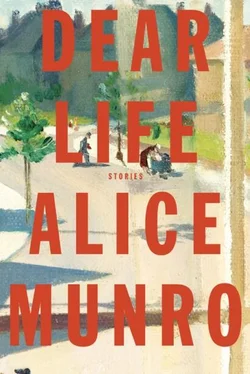During my time at the first school, I did make one friend. A girl whom I’ll call Diane arrived partway through my second year. She was about my age, and she lived in one of those houses with a sidewalk. She asked me one day if I could do the Highland fling, and when I said no she offered to teach me. With this in mind, we went to her place after school. Her mother had died and she had come to live with her grandparents. To dance the Highland fling, she told me, you needed clicking shoes, which she had and, of course, I didn’t, but our feet were nearly the same size, so we could trade while she tried to teach me. Eventually we got thirsty and her grandmother gave us a drink of water, but it was horrid water from a dug well, just like at school. I explained about the superior water we got from a drilled well at home, and the grandmother said, without taking any sort of offense, that she wished they had that, too.
But then, too soon, my mother was outside, having gone to the school and discovered my whereabouts. She honked the car horn to summon me and didn’t even respond to the grandmother’s friendly wave. My mother did not drive often, and when she did there was a nervous solemnity to the occasion. On the way home, I was told that I was never to enter that house again. (This proved not to be a difficulty, because Diane stopped appearing at school a few days later—she had been sent away somewhere.) I told my mother that Diane’s mother was dead and she said yes, she knew. I told her about the Highland fling, and she said that I might learn it properly sometime, but not in that house.
I did not find out then—and I don’t know when I did find out—that Diane’s mother had been a prostitute and had died of some ailment it seemed that prostitutes caught. She’d wanted to be buried at home, and the minister of our own church had done the service. There had been controversy over the text he had used. Some people thought he should have left it out, but my mother believed that he had done the right thing.
The wages of sin is death.
My mother told me this a long time later, or what seemed a long time later, when I was at the stage of hating a good many things she said, and particularly when she used that voice of shuddering, even thrilled, conviction.
I kept running into the grandmother now and again. She always had a little smile for me. She said it was wonderful how I kept going to school, and she reported on Diane, who also continued at school for a notable time, wherever she was—though not for as long as I did. According to her grandmother, she then got a job in a restaurant in Toronto, where she wore an outfit with sequins on it. I was old enough at that point, and mean enough, to assume that it was probably a place where you also took the sequin outfit off.
Diane’s grandmother wasn’t the only one who thought I was taking a long time at school. Along my road, there were a number of houses set farther apart than they would have been in town but that still didn’t have much in the way of property around them. One of them, on a small hill, belonged to Waitey Streets, a one-armed veteran of the First World War. He kept some sheep and had a wife I saw only once in all those years, when she was filling the drinking pail at the pump. Waitey liked to joke about the long time I had been at school and how it was a pity that I could never pass my exams and be done with it. And I joked back, pretending that was true. I was not sure what he really believed. This was the way you knew people on the road, and they knew you. You’d say hello, and they’d say hello and something about the weather, and if they had a car and you were walking, they would give you a ride. It wasn’t like the real country, where people usually knew the insides of one another’s houses and everybody had more or less the same way of making a living.
I wasn’t taking longer to finish high school than anybody else who went through the full five grades would do. But few students did that. Nobody expected in those days that the same number of people who entered high school in grade nine would come out, all stuffed with knowledge and proper grammar, at the end of grade thirteen. People got part-time jobs and gradually those turned into full-time jobs. Girls got married and had babies, in that order or the other. In grade thirteen, with only about a quarter of the original class left, there was a sense of scholarship, of serious achievement, or perhaps just a special kind of serene impracticality that hung on, no matter what happened to you later.
I felt as if I were a lifetime away from most of the people I had known in grade nine, let alone in that first school.
In a corner of our dining room was something that always surprised me a little when I got out the Electrolux to clean the floor. I knew what it was—a very new looking golf bag, with the golf clubs and balls inside. I just wondered what it was doing in our house. I knew hardly anything about the game, but I had my ideas about the type of people who played it. They were not people who wore overalls, as my father did, though he put on better work pants when he went downtown. I could, to some extent, imagine my mother getting into the sporty kind of clothes you would have to wear, tying a scarf around her fine, blowing hair. But not actually trying to hit a ball into a hole. The frivolity of such an act was surely beyond her.
She must have thought differently at one time. She must have thought that she and my father were going to transform themselves into a different sort of people, people who enjoyed a degree of leisure. Golf. Dinner parties. Perhaps she had convinced herself that certain boundaries were not there. She had managed to get herself off a farm on the bare Canadian Shield—a farm much more hopeless than the one my father came from—and she had become a schoolteacher, who spoke in such a way that her own relatives were not easy around her. She might have got the idea that after such striving she would be welcomed anywhere.
My father had other ideas. It wasn’t that he thought that town people or any people were actually better than he was. But he believed perhaps that was what they were thinking. And he preferred never to give them a chance to show it.
It seemed that, in the matter of golf, it was my father who had won.
It wasn’t as if he’d been content to live the way his parents had expected him to live, taking over their decent farm. When he and my mother left their communities behind and bought this plot of land at the end of a road near a town they didn’t know, their idea was almost certainly to become prosperous by raising silver foxes and, later on, mink. As a boy, my father had found himself happier following a trap-line than helping on the farm or going to high school—and richer, too, than he had ever been before—and this idea had come upon him and he had taken it up, as he thought, for a lifetime. He put what money he had collected into it, and my mother contributed her teacher’s savings. He built all the pens and shelters in which the animals would live, and put up the wire walls that would contain their captive lives. The plot of land, twelve acres large, was the right size, with a hayfield and enough pasture for our own cow and whatever old horses were waiting to be fed to the foxes. The pasture ran right down to the river and had twelve elm trees shading it.
There was quite a lot of killing going on, now that I think of it. The old horses had to be turned into meat and the fur-bearing animals culled every fall to leave just the breeders. But I was used to this and could easily ignore it all, constructing for myself a scene that was purified to resemble something out of the books I liked, such as Anne of Green Gables or Pat of Silver Bush . I had the help of the elm trees, which hung over the pasture, and the shining river, and the surprise of a spring that came out of the bank above the pasture, providing water for the doomed horses and the cow and also for me, out of a tin mug I brought there. Fresh manure was always around, but I ignored it, as Anne must have done at Green Gables.
Читать дальше












